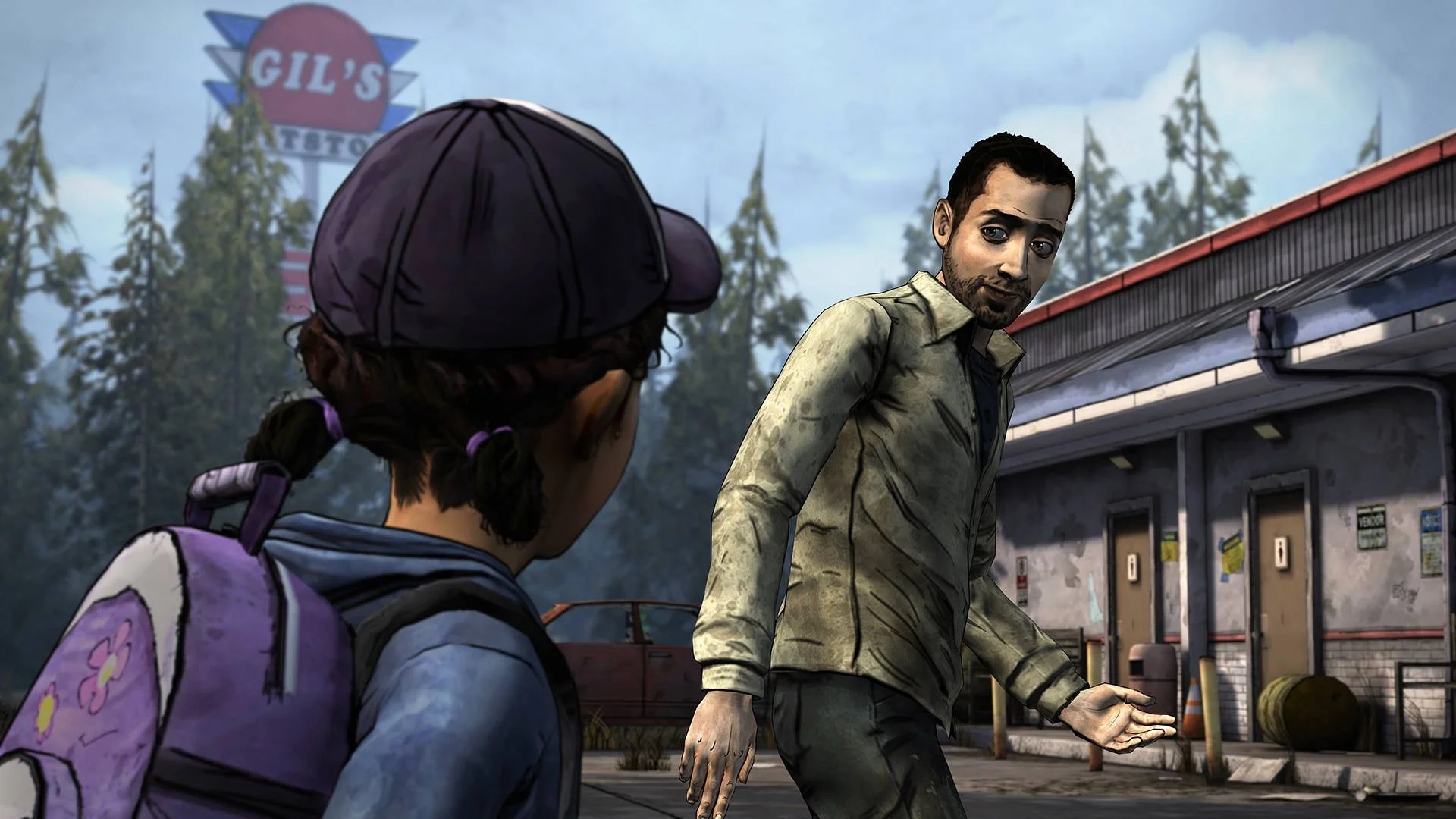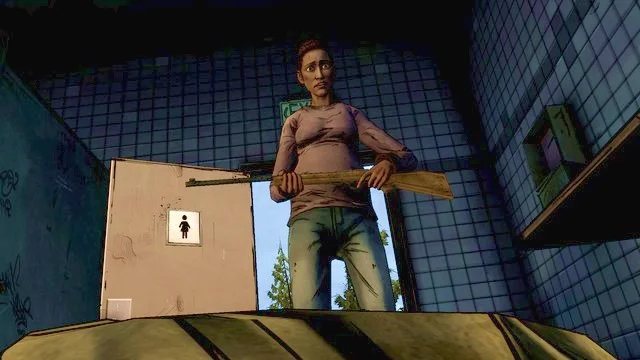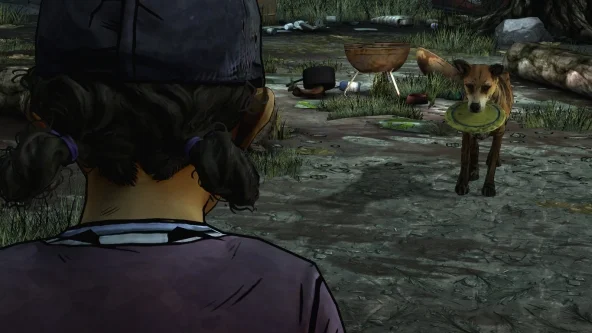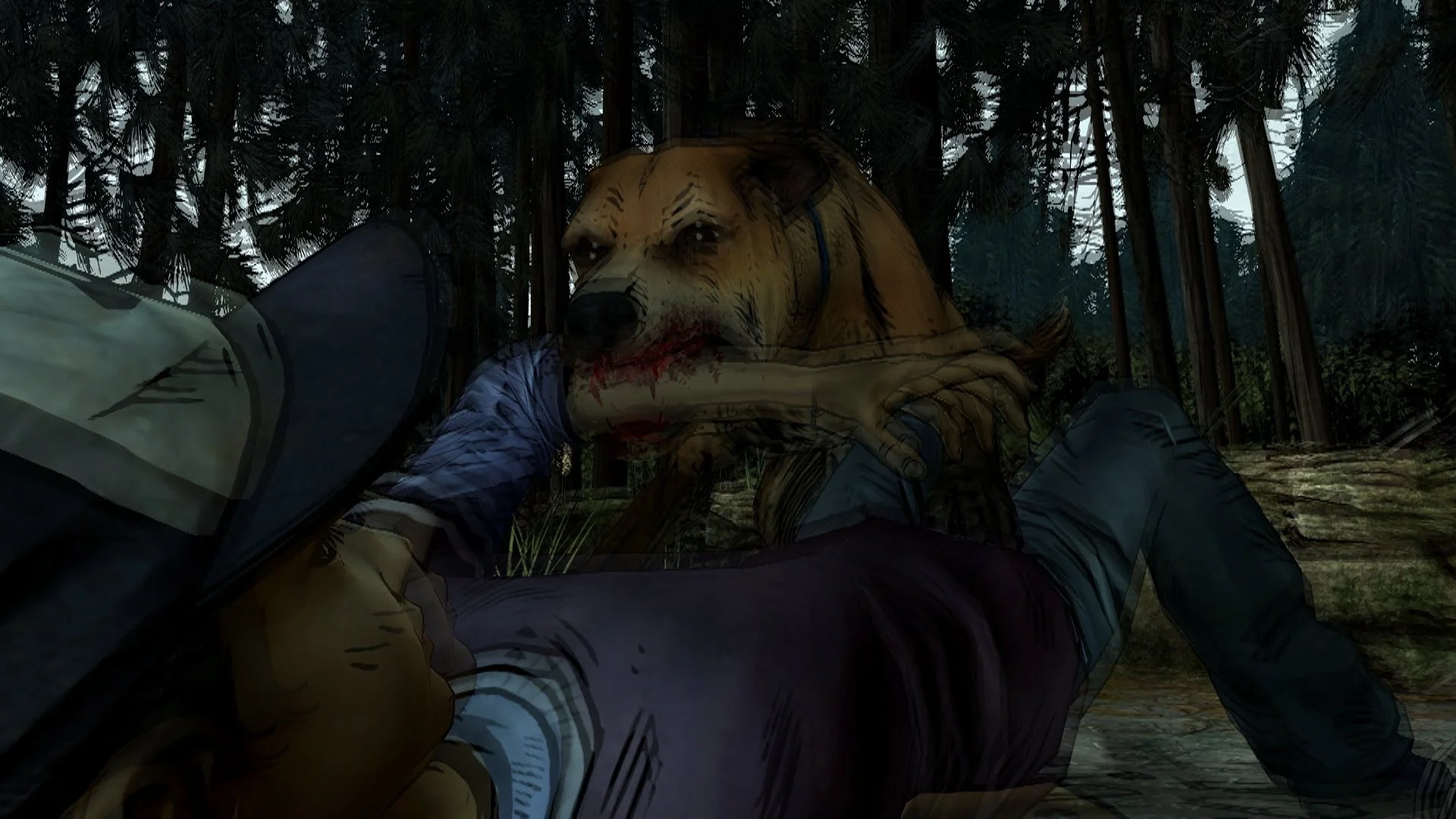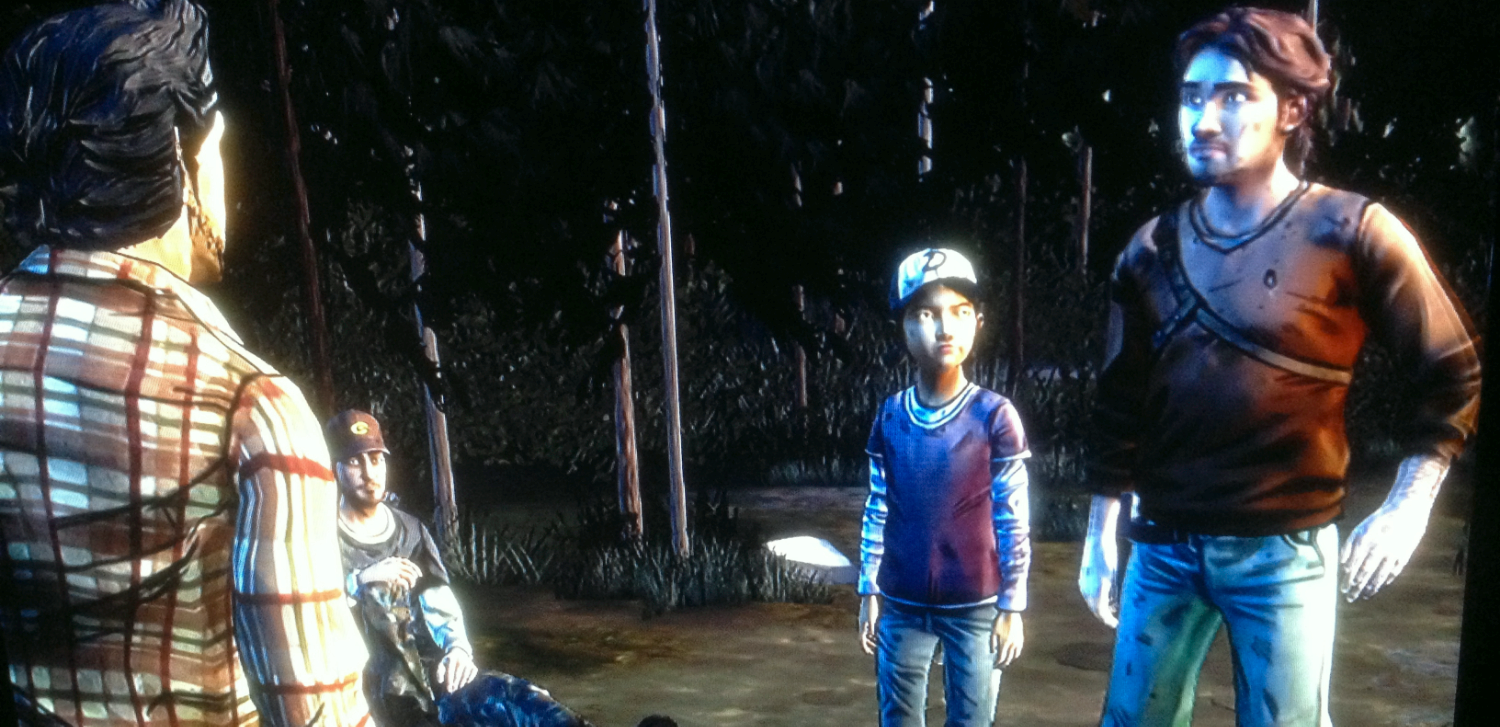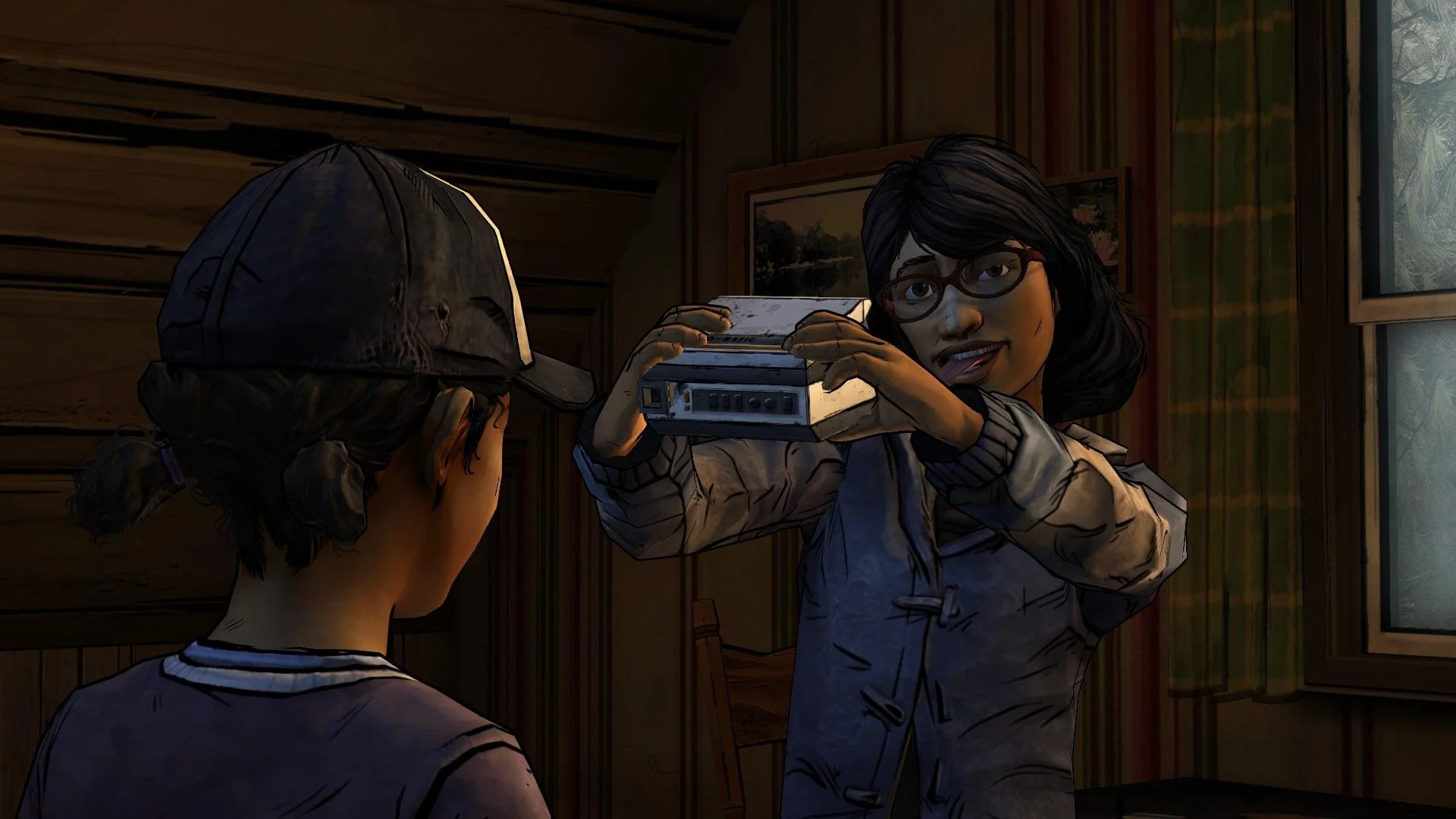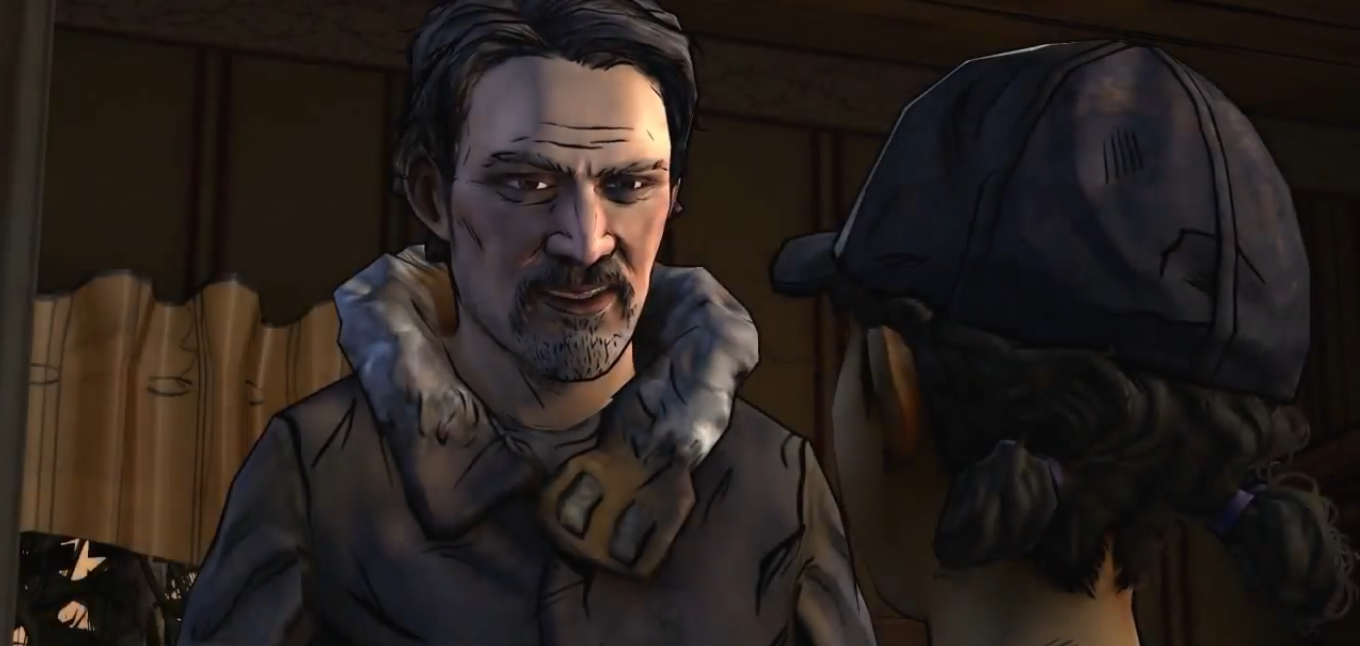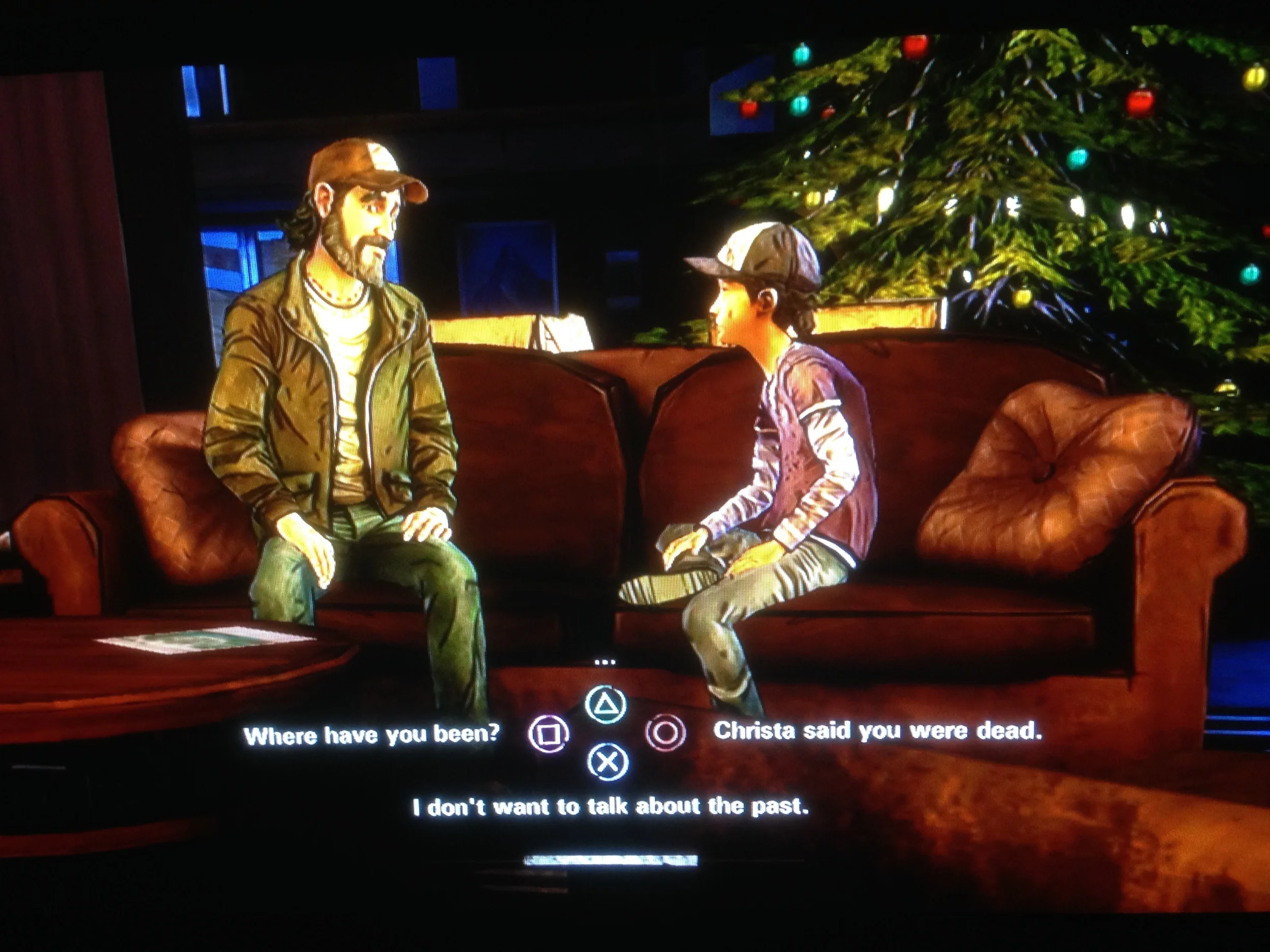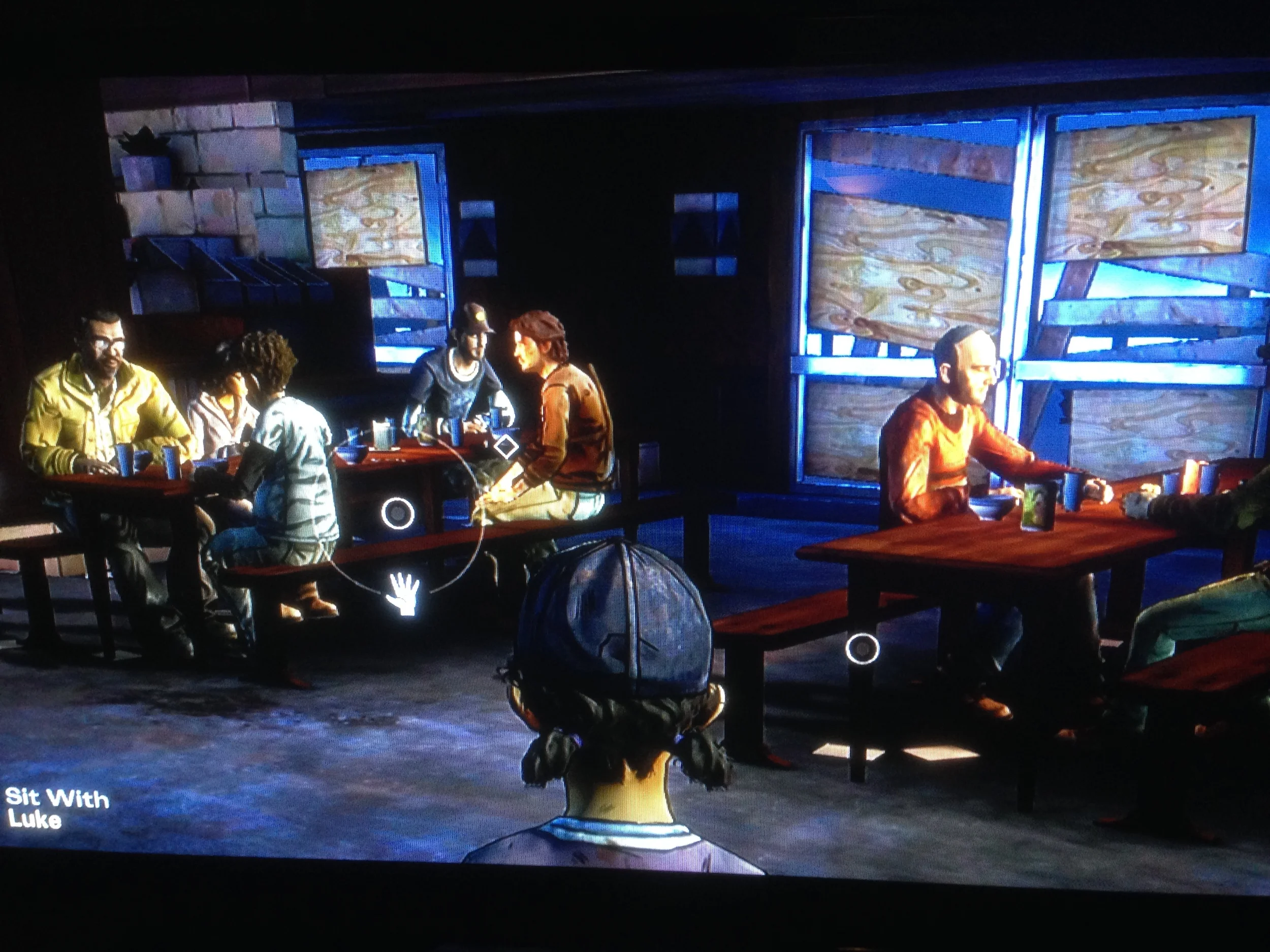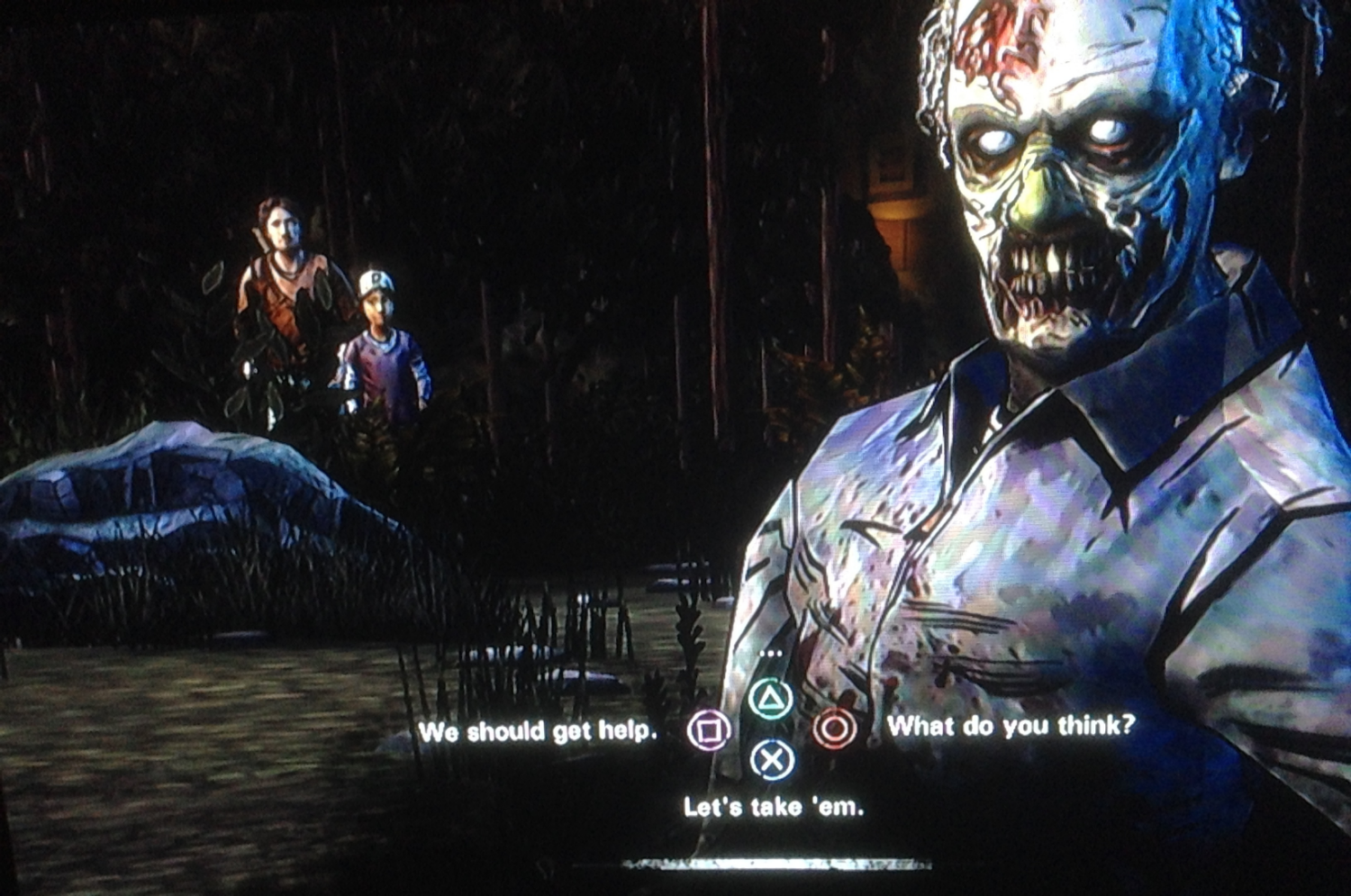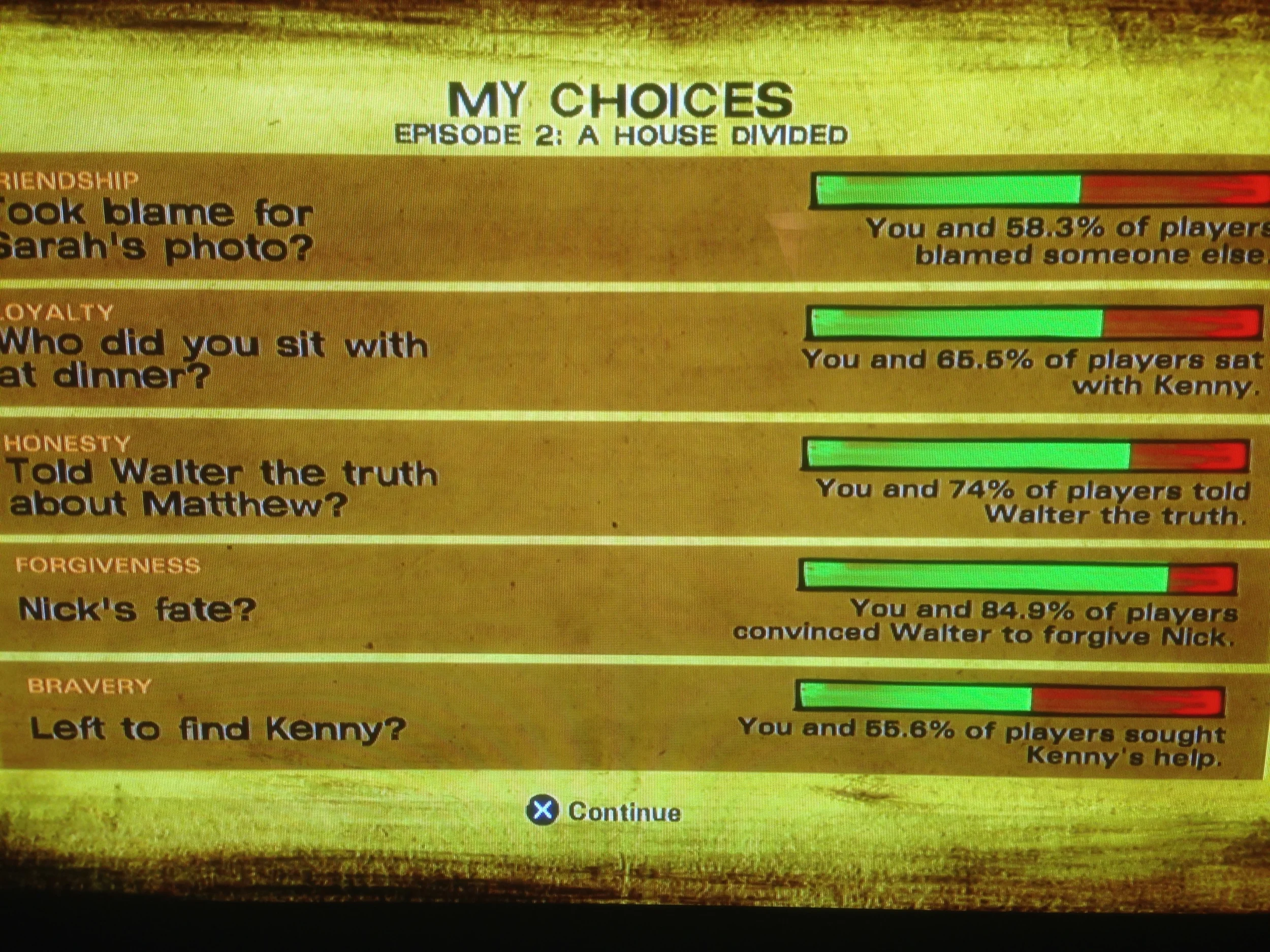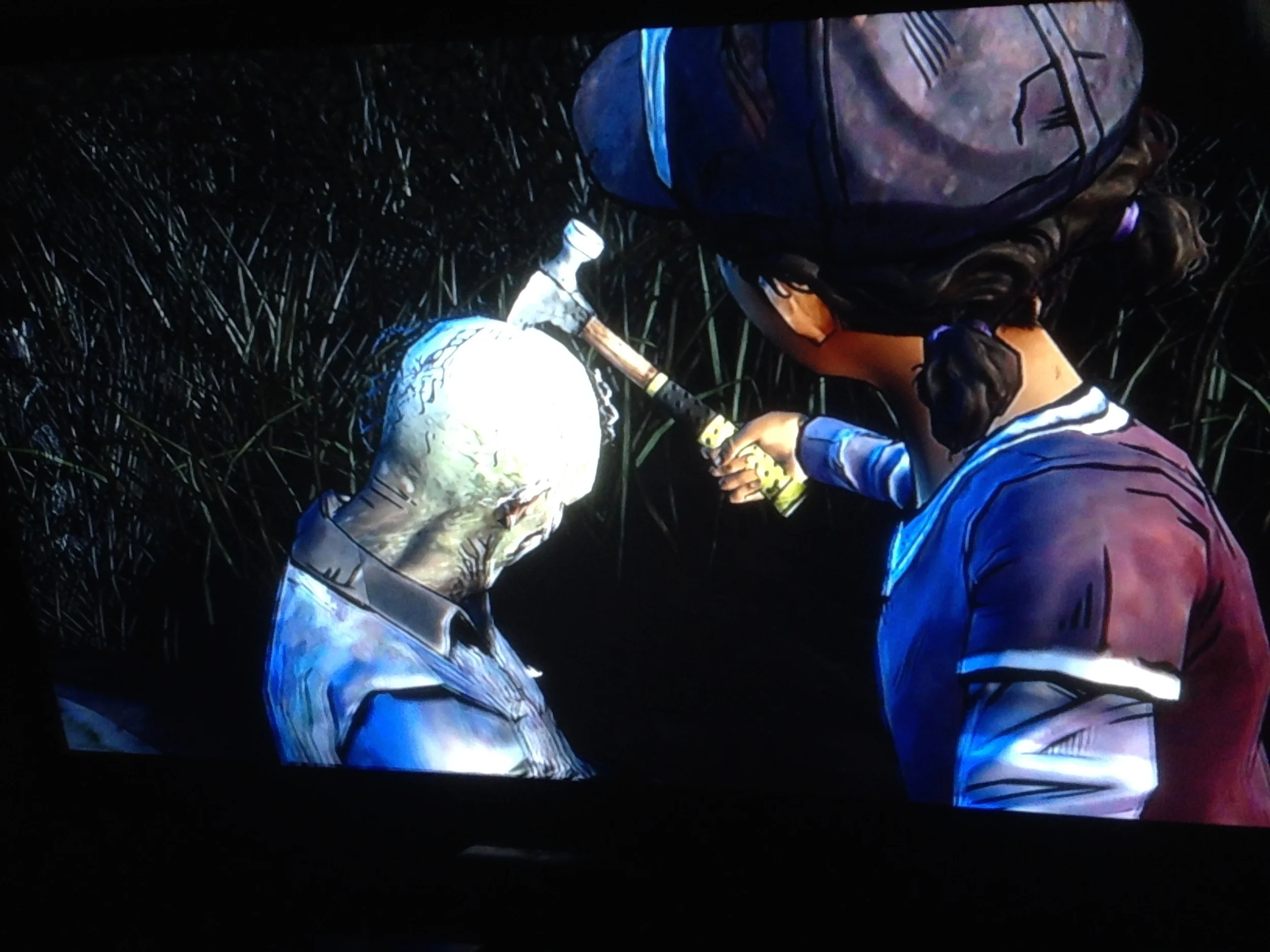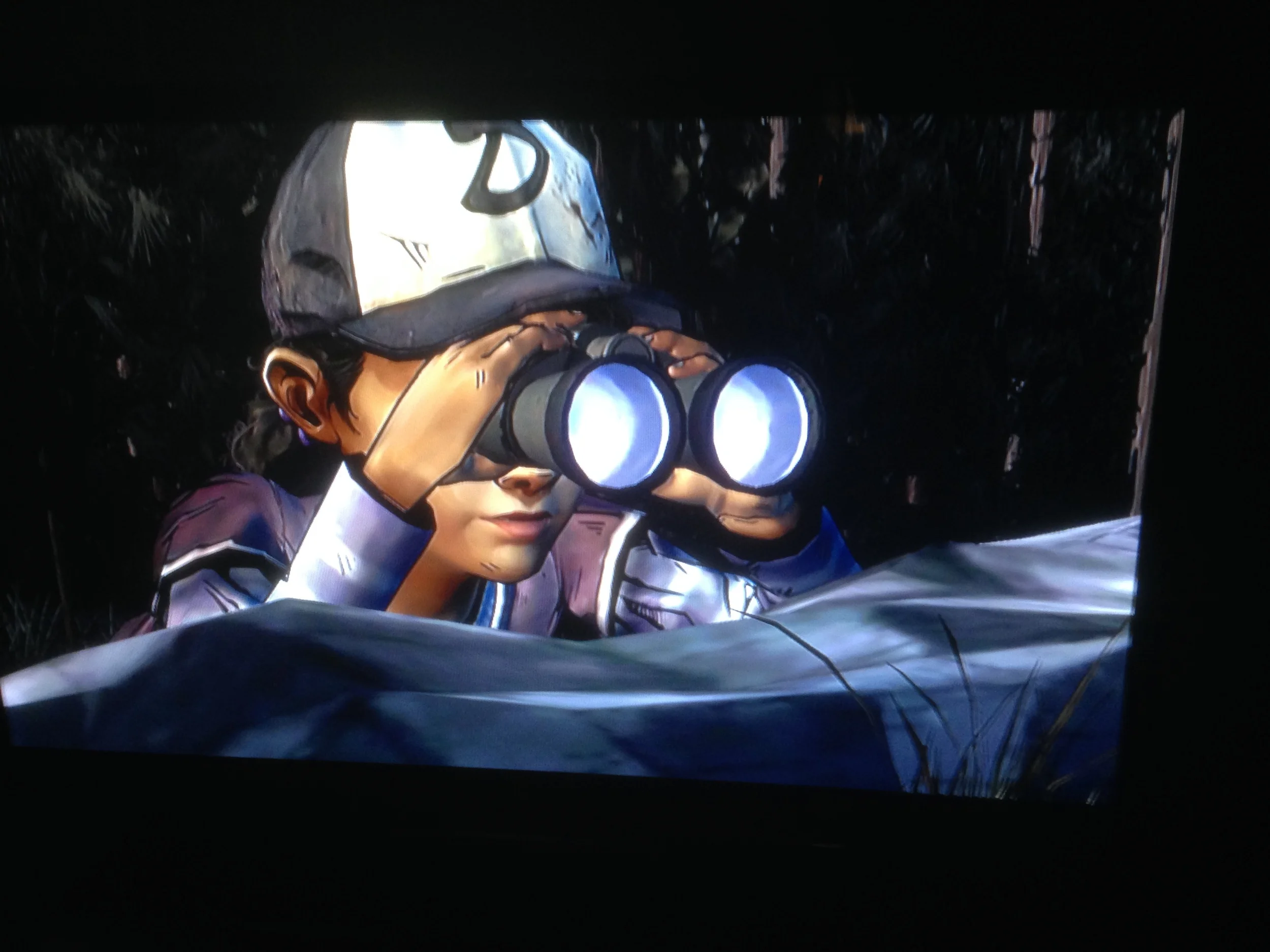SPOILER ALERT! Before you read any further, be aware that this post covers spoilers for Season One, 500 Days, and Season Two (Episodes One & Two) of Telltale's The Walking Dead game series. If you've played them, then read on. Otherwise, go download them now (they're all awesome!) and come back when you're done.
Moving on, then.
LEAVE MY GIRL ALONE
After the harrowing end of Season One and the mysterious vignettes of the mid-season episode 500 Days, I wasn't sure where Telltale planned to take us in Season Two. The first season wrapped up most of its story threads and 500 Days focused on lots of new characters, leaving a wide berth for Telltale to explore in this new set of episodes.
So far, they seem to be taking full advantage of this kind-of blank slate. While Clementine has taken over for Lee as the character you'll be controlling this season, the way in which you interact with this chilling world remains largely unchanged: left stick for movement, right stick for looking around, face/shoulder buttons for on-screen contextual actions. I did notice that a few of the interface visual improvements (better cursor, more descriptive icons, etc.) introduced in Telltale's other series, The Wolf Among Us, have been carried over to The Walking Dead, which is nice to see.
WHERE TO NOW?
Although Clem starts out with Christa and Omid from Season One, I was shocked at how quickly the writers push our young heroine out into the world completely on her own. Yes, she's grown up a little; and, yes, wonderful voice actress Melissa Hutchison has reflected that aging with a slighter deeper timbre. But this is still a story about a little girl forced to survive, alone, in a zombie-infested world. I appreciated the continued willingness by these storytellers to try risky scenarios that might not be possible in other mediums.
Rather than review the entirety of the plot, I'll center this review on sharing a few of my favorite highlights from the first two episodes of Clementine's new adventure. Individual moments are what defines The Walking Dead game series, so it only seems fitting to put them front and center.
GIVE A DOG A BONE
The first of these moments is a disarmingly simple encounter with a dog.
We haven't seen many animals in The Walking Dead; pets are a relic of the past when you're living in a world in which any stray sound can attract a horde of walkers and every mouth you need to feed is a liability. And yet Clementine is instinctively drawn to befriend Sam, a stray dog she meets shortly after separating from Christa. These glimpses of humanity shining through in this ravaged world help cleanse your palate, but they never last long.
It's easy to forget that the animals we love so much have their own survival instincts; we know that Sam was once a pet thanks to his collar, but he's been forced to accept a newer, more cruel reality just like the people. When Sam inevitably attacks Clem over a spilled can of beans, biting her arm, logic tells me I should have been angry with him. Instead, I felt the frustration of having let my guard down, just for a moment.
Sure, the game designers were leading me down this path, but I wanted to trust this dog. I wanted some companionship and security in the ominous woods. So when I realized the ensuing struggle found Sam sadly impaled on some discarded camping equipment, I empathized with the poor creature and chose to have Clem put him of his misery (with a knife, no less).
A reminder: she is eleven years old.
These are the types of scenes storytellers typically reserve for grittier, adult "anti-heroes" (House of Cards, anyone?) as a means to prove their ability to make the hard decisions and sacrifices they'll need if they hope triumph over whatever Big Bad is in store. Here, though, we only see a little girl's innocence fading, replayed again and again.
PLAY IT COOL
Season Two centers largely around a new group of survivors that (eventually) accept Clementine into their ranks. Of note is Sarah, another young girl who serves as a perfect foil to Clem: she's been sheltered from much of the awfulness now facing their world by her father and lives a happier, if deluded, life because of it. Through her, we get a peek into the life that Clem could have had but was never afforded. It's fascinating to explore the conversation options available when Sarah wants to talk to Clem about such trivial topics as books and taking selfies with a Polaroid camera.
Clem is fully aware that the stakes inherent in her reality don't leave room for such niceties, but you're given the chance to let her indulge Sarah if you desire. The ability to steer Clementine's path to adulthood down two different roads adds a layer of responsibility to the choices we were making in Season One. It's not always about pure survival anymore; what about preserving what it means to be human? To care that someone else is happy and not merely alive?
Hang out with Clementine, though, and trouble will come knocking, as it literally does when Carver, a mysterious man who has been hunting down your group, shows up at the cabin when only Sarah and Clem are home. This encounter gives players the chance to test their poker face as Clem tries to mislead Carver into believing a fabricated story meant to protect the whereabouts of this new group. I loved trying to pick the responses that would keep the cover story intact while simultaneously ushering this new threat back out the door.
This also gives us a chance to see Sarah's walled garden of ignorance begin to crack at the seams. She obviously won't be able to live under a rock forever, but you can choose how much of her worldview Clem is willing to preserve. It's rare to see a child character thrust so far beyond the responsibilities her age should dictate, but Telltale handles these story beats with the appropriate tact and weight.
WHO'S HUNGRY?
The final moment I'll cover comes later in Episode Two, after Clementine is reunited with Kenny from Season One. It was nice to see a familiar face after spending so much time learning about these newcomers, and the game strikes a good balance between fan service/nostalgia and an experience that doesn't alienate new players. What's more, Kenny has softened a bit from his better self at the end of Season One (although we're not totally clear on why yet); but, just like Clementine, he has a new group as well. The two factions rely on these old friends to barter a peace.
While there are plenty of action scenes at the end of episode two, I found the most compelling part of this episode to be the clique dynamic of the two groups, which should resonate with anyone who attended middle or high school. Episode two is titled "A House Divided," and, while this works on a number of levels, its essence is born out perfectly the first time the two groups sit down for a communal meal.
One of the series-defining "big decision moments" in this episode is simply choosing the table Clementine will sit at during dinner. Instead of a life or death crisis, we're just asked to pick between new friends versus old.
Choices like this embody The Walking Dead at its absolute best. I spent minutes agonizing when these prompts appeared because Telltale gets me so damn invested in these characters. Movies or TV shows might try use visual cues to put the audience in the mind of a character to attempt to show the difficulty of a weighty choice, but only video games can give players the opportunity to experience the awfulness of choice firsthand.
TWO ROADS DIVERGED
Other games that involve choice, like Mass Effect or inFamous, too often stop short at binary decision trees: you are either good or bad, and choosing to live in the grey area means you're missing out on gameplay perks or skills. The Walking Dead encourages you to explore that grey area to its fullest with most conversations having four equally murky responses.
The binary choices, on the other hand, are kept to a minimum: five big decisions per episode that show up at the end of the episode with worldwide player stats who picked what.
In most previous episodes, these results revealed that the bulk of players took the same path, likely driven by the "right thing to do." When I saw the green and red bars for episode two, however, I was pleasantly surprised to see so much more divergence among player choices. Telltale is clearly muddying the waters in the best possible way and building tension around the unknowable "correct" path. While making tough decisions has always been the goal of these games, these numbers are proof that they're succeeding in making the decisions tougher than ever.
VERDICT: OH MY GOD, BUY THESE GAMES NOW
If you possess a device that can play The Walking Dead, you're doing yourself a huge disservice by not downloading and installing these wonderful games. The mechanics are simple enough that new players should find a low frustration threshold, and the stories are universally captivating (if gruesome at times).
But the really awesome news is that Season Two proves that Telltale is only getting better with age. The first two episodes of the new season span so many memorable and nerve-wracking moments that I'm surely not alone in eagerly anticipating the remaining three installments.
As the writers explore the theme of Clementine growing up (maybe too fast), I'll be watching carefully to see how much control players are actually given to truly shape her personality. We won't know the impact of these decisions until later, of course, but I'm sincerely hoping that the decisions made in these early episodes bear drastic and permanent consequences further down the road.
On a technical note, Telltale games have always had their fair share of graphical issues: jerky framerate, awkwardly-long loading transitions between scenes, and a general sense that some game engine optimization would really be worth Telltale's time. Those blemishes do crop up in Season Two; however, they are much less noticeable than the issues in Telltale's other series, The Wolf Among Us, which seems to be pressing our last-gen hardware to its limits. For both series, I'd love to see smoother versions on PS4 and Xbox One; still, the issues are minor enough to be overlooked.
More than anything else, episodes like this represent the future of storytelling in a way that books, movies and television can only hope to emulate. I've read some complaints that this second season of The Walking Dead doesn't give players a clear enough view of where its headed; for me, though, their brilliance lies in that uncertainty.



